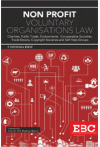- Author(s): P. Ishwara Bhat
- Publisher: Eastern Book Company
- Edition: 1 Ed 2018
- ISBN 13 9789387487352
- Approx. Pages 800 + Contents
- Format Hardbound
- Approx. Product Size 24 x 16 cms
- Delivery Time 3-5 working days (within Kerala & South India) (Others 7-9 days)
- Shipping Charge Extra (see Shopping Cart)
Charities, Public Trusts, Endowments, Co-operative Societies, Trade Unions,
Copyright Societies and Self Help Group
.............................................................................................................................................................................................................
Description
Acceptance of an academic assignment on the subject of Indian NPVO law as a part of transnational research work at the University of Mysore a decade ago was a point of my entry into this sphere, which is almost unexplored one. Initially I had a hesitation because of the apparently dry, procedural and formalistic legal framework scattered over varieties of Central and State laws. When I proceeded ahead by looking to the philosophical, social and moral foundation of the law, I found the area interesting and realised that it could be integrated with a coherent theoretical discourse. The subject is extremely important as it pertains to one major sector of the legal system, and involving great amount of socio-cultural, intellectual, humanitarian and philanthropic service to the society. The fact that the law is in the process of refinement from time to time owing to societal needs and challenges of changing times and that in spite of constitutional, legal and social aspirations the law has escape points for opportunistic and unscrupulous persons, calls for a critical study of the legal domain. The opportunity to research, interact, write and make presentations in several occasions on various issues at different forums shaped the present work. A final shape could be given to it as a product of my LLD study at the National Law School of India University. Why we should study NPVO law with a critical insight has been explained convincingly by Prof. Madhava Menon in his scholarly Foreword to this work. In order to keep the house in order, to know and practice in the field, to guard against abuses, to strive hard towards excellence and fulfilment of social expectations in the working of NPVOs, and to reform, such a study is instrumental. The values of transparency, good governance and professionalism, which have become constitutional ideals for co-operative societies after the 97th Constitutional Amendment, are equally relevant and important for other NPVOs as well. Professionalism is a mindset for attaining excellence in service. In a service oriented work of NPVOs, such a drive of motivation has a great potentiality of social benefit. Democratic participation by the relevant community adds to enthusiasm for robust functioning of the NPVO and brings accountability. Transparency enables both. Good governance helps in the choice of appropriate objective and the task of purpose compliance. While law has positive role in ensuring these benevolent goals, regarding the deviance and undersides it has a regulative strategy and remediating policy. In these matters, law has varieties of approaches about the management of NPVOs by providing different patterns and structures of organisations, funding arrangements and control mechanisms against abuses.
.............................................................................................................................................................................................................
Contents
Part I : General, Conceptual and Constitutional Dimensions of NPVO Laws
Part II : Laws on Charities, Public Trusts, Endowments and WAQF
Part III : Laws on Organisation
Part IV : Laws on Economic Support to NPVOS
Part V : Laws Support NPVO Funding
Part VI : Conclusions
Annexures
Bibliography
Subject Index
.............................................................................................................................................................................................................
Author Details
P. Ishwara Bhat, is Vice Chancellor of the Karnataka State Law University, Hubballi, He has four decades of experience in teaching and conducting research in law, and specializes in constitutional law and research methodology. He has previously served as professor of law at the University of Mysore, Karnataka, and as Vice Chancellor of The West Bengal National University of juridical Sciences, Kolkata.

